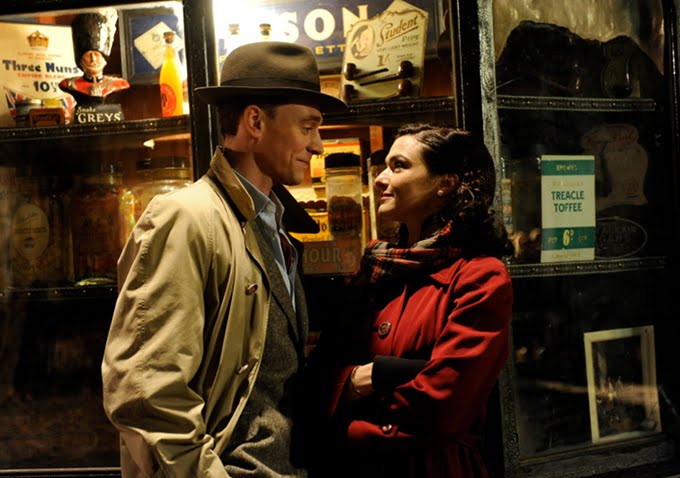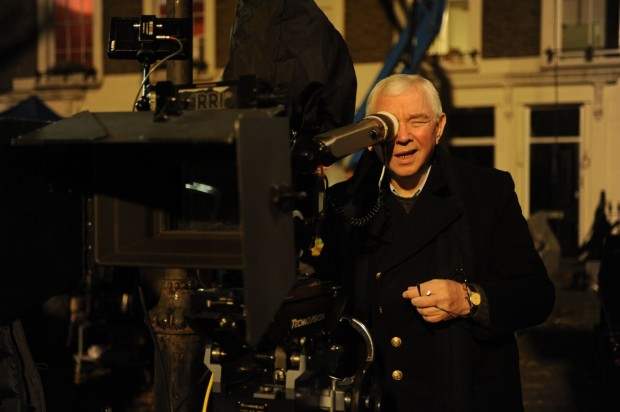
It might be the accent, or maybe just his grandfatherly nature, but I don’t know if I’ve been so effortlessly charmed by someone as Terence Davies, the writer/director of the new release The Deep Blue Sea. Come to think of it, it could have been the answers to these questions, as it seems many of the ones I posited were…off the mark. But the Liverpudlian gave patient, calculated responses to all, amidst being shuffled room to room, TV interview to roundtable session, with grace. Have I mentioned I liked the man yet?
We discuss how no one in Jane Austen’s time went to the bathroom, no one in the 1950s could have possibly procreated, when the happiest points of Mr. Davies life were, the sensuality (not erotica) that skin has, and how he learned what true love is and how that affected this film. The following is a transcript of a roundtable discussion conducted by myself and Winn Periyasamy. Our questions are in bold, with Mr. Davies following.
It’s been a bit of a gap between your last film–
(Terence smiles ruefully)
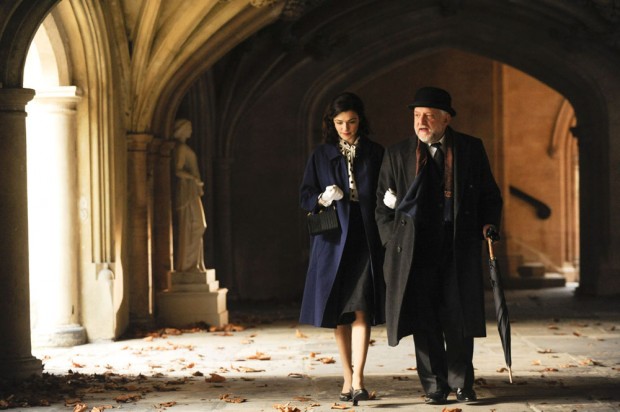
I’m sure you’ve heard this question before. Is there any reason for the gap between films?
A mixture of things, really. We don’t really have a [film] industry in England. It’s a cottage industry. At one time we did have a strong proper industry. [Now] every now orthodoxy comes in, and if you don’t fit that orthodoxy, then no one’s interested.
There’s this constant of, “Will Americans like it?” And what we get is endless things in the ’30s or Jane Austen…I don’t know how anyone can find those interesting, at all. It’s got nothing to do with the way Britain was, particularly in the ’30s. I remember someone sending me a script by Jane Austen and the opening sequence was: this maid comes down with a jug of water and drops the water. And I said, “well she wouldn’t have a jug of water. She’d be emptying the pots from the night before. This would be urine and feces.” [They said] “We can’t do that.” I said, “Why not? They don’t go to the toilet in Jane Austen?” They said, “no. They don’t.” Oh. I wonder how they managed….
It’s that sort of nonsense. And also the same group of people giving the same performances, year in and year out. It is so debilitating. I’m just not interested in it. When you’re not in the mainstream–and I cast people I think can do it, not because of their names–that’s also becoming more and more difficult. The worst thing is the orthodoxy, and it changes all the time. So you’re constantly two orthodoxies behind. People just weren’t interested. So I thought, “oh well, that’s it.” After eight years I can’t get anything off the ground. That’s it – curtains. And that’s what I did think.
Have you had this specific script in mind, this play, or did it come to you during the in between?
It came out of the blue. The [Rattigan] trust got in touch with me. It was Rattigan’s centenary in 2011 and they wanted to get a film [made] because there were lots of revivals of the plays. The UK Film Council were fantastic. They put into our film as much money as they could, which was £1 million. And then other people came in with [the] other £2.5 million.
We shot in 25 days because that’s all we could afford. That came about because of the centenary. From the first draft to the final show print was just a little over a year. So we proved it could be done, with commitment. The other problem with England is that it’s easier to say, “no” than “yes.” We’re very good at saying, “no.”
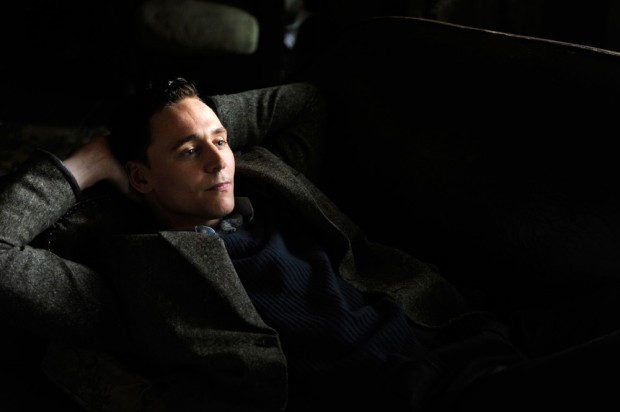
I was reviewing your films and there seem to be numerous parallels. The 1950s, which I knew you grew up in, and the idea of women in a repressed society, and this film fits very well in those terms. What intrigues you about those themes? Why do you continue?
Well I grew up in the ’50s; I know what they were like. And it’s not just knowing what they looked like, it’s knowing what they felt like. And knowing what the mores were. There were certain things you couldn’t do. I mean, there are certain things you did not do. When younger people, who have not been through it–even some of the financiers.
When [Hester, Rachel Weisz] runs out the door to go after Freddie [Tom Hiddleston], the front door’s left open. I said, “Yes,” because in those days, in a working class area, you left your door open until ten o’clock, you closed the door. At eleven o’clock, you locked it and then you went to bed. “Oh, this is a real problem.” Well we can’t go back and shoot it, we haven’t got the money. We can’t drop it, because it’s an important beat in the film. What I should have done, of course, was leave the door closed and have her run through it leaving her shape [in her wake], y’know, like they do in cartoons.
That didn’t go over well, either. Ten, twenty people talking about an open door, you think, “There’s got to be more to life than this. There really, really has.” Especially when they don’t know [of what they speak]. I do know because I grew up then. It’s that sort of thing.
Same with [relating to] the younger actors. When they’re sending up Terry Thomas, or Ian Carmichael, and they’ve never heard of them. And you think, “god, they’ve never heard of them. Quite extraordinary.” I grew up with those people, particularly Terry Thomas. He was a comic genius.
But the mores of the time they don’t know about. Why should they? They’re young people. But because I grew up in that era I know what it was like. And every now and then I’d say, “you can’t do that. They just wouldn’t have done that.” Or they wouldn’t have said it in that way.
And between 7 and 11, which was ’52-’56, I was incredibly happy. Those four years were just joy, absolute joy. Taken to the movies, my father was dead, thank God, because he was horrible. I was in a lovely little school and I was going to the movies all the time. Then I left primary school for a boy’s school, where I was just beaten up for four years and my paradise was over (snaps) like that. But you remember those things very, very deeply. When things happen to you as a child, you never forget them. Never.
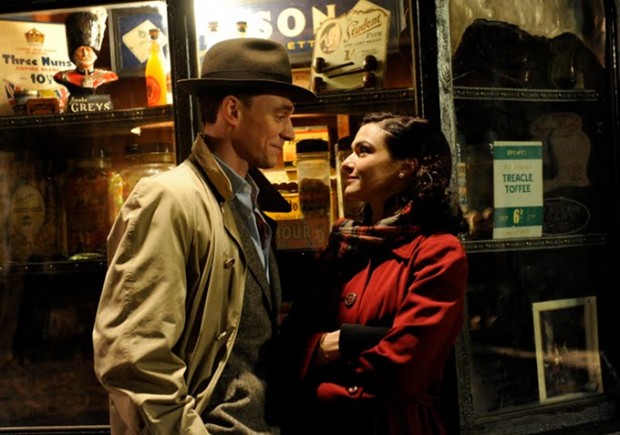
That links in well with this film. I noticed that most of the passion happens right off the bat. There is a sex scene at the front, but the rest of the movie are these traumatic events that Rachel Weisz’s character goes through. Is there a connection with you and the traumatic events that shaped it?
No, no, I haven’t been through that. What I had been through, is at the end, she comes to know true love. Real love. To say, “if you’re better off without me, then I’ll go.” My mother died in 1997 and she was the love of my life. The last time I saw her, she had her head lying on the bed, and I said, “I just want you to know that I love you more than I can say. You’ve been the love of my life.” And she said, “I love you, too.” We just held each others hands and sat in silence for about twenty minutes and I would have given everything I had, in the world, to just stay one minute more, to hear her voice once more. And then she died.
What I realized was that my feelings were secondary. She wanted to go and you can’t be selfish. You can’t. She had to; it was important for her. I don’t think I could, in a way, make part of this film without having gone through that myself. But it’s very, very hard when you love someone, to let them go. Death comes to us all, you can’t get away from that. But it’s all the same if you’re in love with someone and you’ve got to let them go because you know staying together…it won’t work. It will destroy it. It will become about possessiveness, and that’s so destructive and corrosive. That was autobiographical.
I know that for the time period that it’s set in, the material is very racy. For modern audiences it might not be quite as a surprise. Did that affect how you adapted the material at all?
No. You can’t go and say that any audience, whether they’re young or old, you just can’t. You have to be true to the material and if people like it, they’ll come and see it. If they don’t, they’ll stay away. You’ve got no control over that. But what I don’t think you can do is if it’s of a certain time, you cannot change it simply to make it modern, or modernize it. You undermine the source material. It’s also inaccurate. So I couldn’t do that. Probably why I haven’t got a career! (laughs)
Would you consider this a feminist film?
No. Oh, absolutely not. No. It’s about A person who’s a woman. It isn’t a tract at all. And I’d hate it to be like that. No, not at all.
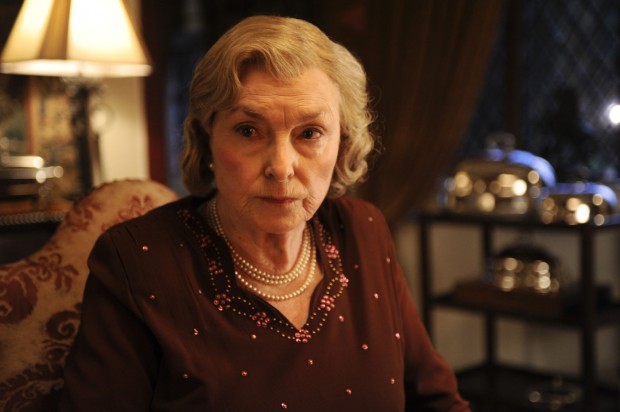
I found it interesting now, especially in the United States, that there’s a general holding down of a woman’s personal desires and wants, physically and otherwise, and this film sort of links in very well with that. A woman trying to find her own happiness against these different forces. Do you think there’s a specific time where this film works better? Is there a link between the film and where we are as a society currently?
It would have obviously worked in the ’50s, but in the ’50s you couldn’t have shown them in bed together. You weren’t allowed to. Everyone slept in separate beds. How they ever got children, God only knows. Presumably will power. There, that’s where I part company with [that idea]. It would be made to be sanitized. And I don’t want anything to be explicit. I [wrote] in the screenplay, when they’re in bed, it must not be explicit, because explicit sex scenes tell you nothing. All they tell you is that both parties go to the gym. They’ve all got this body make-up on and nobody ever gets cramped or falls out of bed. It’s just not real, it’s too messy.
What’s important is to show texture; flesh and texture, that’s all. That can be not erotic, but it can be sensual, and I think that’s more interesting. I think that’s much more interesting. In Letter From an Unknown Woman there’s a moment where [the protagonist] comes back from the opera, she puts her child to bed, and she’s got a white dress on with a scoop back. As she turns to the window, and [the camera] stays on her back as she cries. And it’s very sensual because her skin is like porcelain. It’s very sensual, not erotic.
The shot in bed was just beautifully done, because it was more about the moment…
Well I was rather proud of that, I must say. (laughs)
I know that Rattigan is an important fixture in English theatre, especially now, there’s a return to form for him.
Yes, there’s a revival.
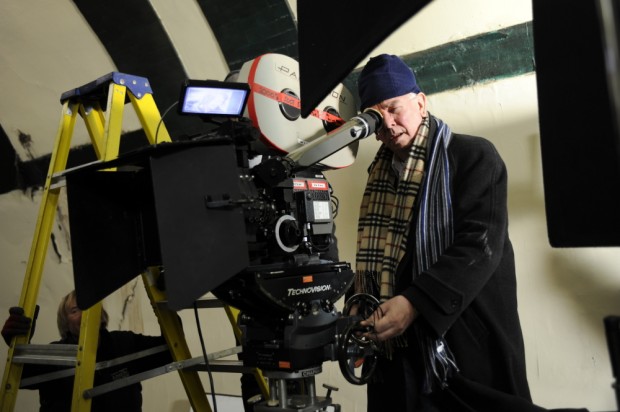
What were the biggest challenges in adapting this material?
When the Rattigan trust asked me to do it, the problem with all the plays is that he puts all the exposition in the first act. And I just don’t like that. Why should we be told? Why can’t we just see it, because that’s what cinema does. So I said, “I want to do it from Hester’s point of view,” so anything she’s not privy to has to go. Most of the exposition is gone, and the first act is collapsed into the first nine minutes. The other scenes, which she’s not privy to, can’t go in, either, because she’s not there. That made it a more interesting trajectory.
Also, shortening the other characters because they other characters in the play don’t really work. Mr. Miller [Karl Johnson], for instance, the implication in the play is that he’s been struck off for some reason, that is socially unacceptable. We don’t know what it is. But he’s a bookie’s runner and he goes and helps [at a] children’s hospital at night. It’s nauseatingly sentimental, just nauseatingly so. You don’t believe it. You just don’t believe it.
It’s much more interesting if he just helps and it’s never explained. “Is he some sort of doctor?” Cause I know when people died [on] my street, two women always appeared to wash the body. Don’t know how they knew, they always came and washed the body. No one ever explained [to me] where they came from, or who they were, or how they knew someone. They just came. He helps Mrs. Elton [Ann Mitchell]‘s husband a lot. And she clearly trusts him. That’s why she calls for him [early in the film].
But I didn’t want it to be anything more than that. Then you have to start explaining why he was struck off, is he a doctor, and it’s kind of mechanical, linear stuff and it’s not interesting. Ambiguity is much more interesting than being told what something is. I love ambiguity, provided it comes from skill. But it’s going to be more interesting.
What you can do in cinema you can’t do in any other discipline: you juxtapose one person with something else, and an ambiguity arises between that cut. And as soon as you see it you start to make up a story. You can’t help it. You add on the soundtrack a ticking clock and have the same two close-ups and it tells you something. Are they both waiting? Are they waiting for each other? Same two close ups and you hear a bell in the background. What does it mean? But it’s changed. A simple close-up can [be] changed by adding one sound. And I love that. I love that so much. It’s exciting because it makes you completely act by working out the ambiguity. That’s interesting.
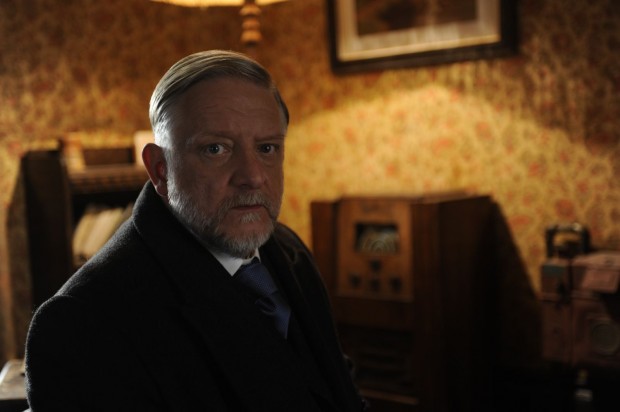
And that’s very evident in the open when, right after the first act crunch, you just see Rachel Weisz’s languidly smoking a cigarette. How do you direct something along those lines? Do you give her a lot of direction or do you give her the screen play and let her figure out what the emotions are and how to play it?
Partially. I saw her in a film, and I didn’t know who she was. I rang my agency and asked, “have you heard of someone called Rachel Weisz?” And they said, “well who hasn’t?” I said, “could you send [the script] to her?” They sent it to her. We spoke on the phone and I said, “if you don’t do it, I have no idea who I’d approach. Would you do it?” And she said yes.
But with any actor, whether the part is big or small, you have to play it oh a shot-by-shot basis. You have to feel it on a shot-by-shot basis. And give them the freedom to do other things. Say, “yeah.” Very often she’d come to me and say, “can we just go straight away?” and I’d say, “yeah, sure.” Or do five takes and get it and ask, “can I do one for Jesus?” Yeah, do one for Jesus. But it has to be felt on a shot-by-shot basis.
And very often you’re just guiding them. I give occasional line readings, because certain lines just have to be said a certain way. They just got to be. And other lines which you hadn’t thought of being said in a particular way and they’re said in a different way and it’s really thrilling, cause I hadn’t thought of that. When someone does something like that I find it so thrilling. “Gotta keep that in…must keep that in….” Or you don’t tell them at all, because they might do it consciously the next time and it won’t be the same.
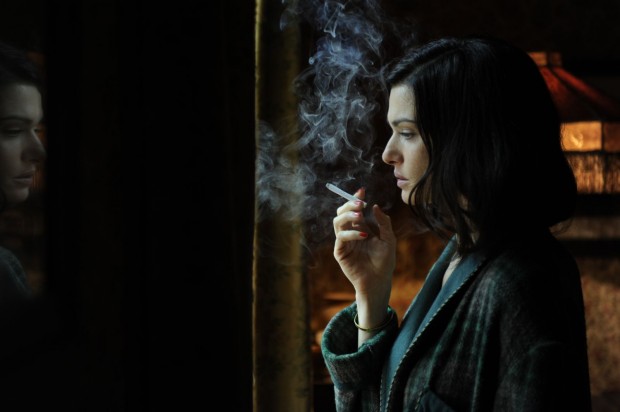
We don’t really see Freddie arc terribly. We see him at the beginning be a lovely gent, a romantic, and then we see him forget her birthday, but we never really see him turn into the drunken lout that we assume he’s been throughout. Was that always planned?
No, because he’s not a lout. He’s not a–he likes to drink, but that’s not the same thing. And people…. You must remember what he’d gone through. The average age of a fighter pilot was between 18 and 22. Sometimes they were flying six or eight [missions] a day. When you saw a German aircraft, your time [of] response was eight seconds. If you didn’t respond in eight seconds, you were dead. So he’d seen all that. Of course it’s got to change him profoundly, and of course he’s going to drink more than he ought to, but he’s not a drunken lout.
But he’s not a lout, either. Why he gets angry is because he thinks [that] my friends got killed, during the war, over Britain, and you’re prepared to throw your life away because I’ve forgotten your birthday? What he doesn’t see is that when you’re in the thrall of love for someone else, the slightest thing means something. You wait for the call to come and it doesn’t come, it’s two minutes late and you’re furious. Or you’re desperate, or you’re pleased.
He doesn’t understand that. William does. It’s true what Freddie says [to him], “I bet you’ve never forgotten her birthday” and you know he’d never have done that. Later on in the film he gives her the book of Shakespearean sonnets. Freddie wouldn’t have thought of that. He says to her, “c’mon, I said sorry. I can’t do it anymore, can I?” No, no you can’t.
But that’s the nature of love. And that’s the nature of possessiveness as well, and that’s always destructive, and that’s why she comes to know true love at the end. She knows true love because of Mrs. Elton. You know, this is what true love’s like. You wash somebody’s ass. And you’ve seen her at the bed and he says, “real dish, wasn’t she?” and she says, “a real dish.” And that was fifty years ago! That’s what real love is. But she only knows that because of Mrs. Elton. Good old Mrs. Elton.
The Deep Blue Sea is now in limited release. Click here for available listings.

